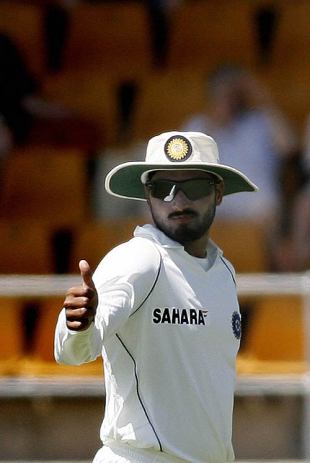|
|
|

As was inevitable, Harbhajan Singh's appeal was successful ... but that does not make him a hero
© Getty Images
|
|
| |
India's performance in chartering a plane to take the players back home in the event of an independent judge finding against them in the Harbhajan Singh case counted amongst the most nakedly aggressive actions taken in the history of a notoriously fractious game. If this is the way the Indian board intends to conduct its affairs hereafter, then God help cricket.
It is high time the elders of the game in that proud country stopped playing to the gallery and considered the game's wider interests. India is not some tin pot dictatorship but an international powerhouse, and ought to think and act accordingly. Brinkmanship or not, threatening to take their bat and ball home in the event of a resented verdict being allowed to stand was an abomination. It sets a dreadful precedent. What price justice now?
Not that the attempt made by Cricket Australia to broker a compromise had much more to commend it. Ricky Ponting and his players were entitled to take a stand on principle. As it happens, I thought their strategy unwise because they had fanned the flames, Anil Kumble had not been given a chance to intervene and the case was unwinnable.
But they were entitled to take a stand and demand a hearing - especially after their disgraceful treatment by the crowd and a local umpire in Mumbai not long ago (not to mention in Kolkata in 2004) last October. The Australian players may have let rage get the better of them but they were within their rights to demand a hearing. Cricket Australia had no business pusillanimously trying to talk them out of it. Racism was the issue, or there was no issue.
As was inevitable, Harbhajan's appeal was successful. Simply, there was not enough proof to justify a conviction. It does not matter what anyone thinks may have happened. Court cases are about facts, not opinions, or allegations or interpretations or guesses. Once the microphones and umpires could not back up the charges, the case was doomed. That does not make Harbhajan a hero. It is high time his seniors took him in hand. He has become a hothead with an unpleasant tongue.
Far from seeking revenge, the Australians should have treated him with derision. Throughout this episode, they have been driven not by reason but by a rage that ruined a match and imperilled a series. Harbhajan is not worth half as much. Nor is it wise to ignore Australia's reputation as champion sledgers. Everything has a history.
All around, it has been a bad business. Over the years, India have often been represented by gentlemen with high principles and a strong sense of sportsmanship. Australia have not been so fortunate. But it seems that power has corrupted. It was intolerable that India's one-day players were sent to Adelaide when they ought to have been practising hard in Melbourne.
It was not an implied threat to the justice system. It was a direct challenge to it. India took part in the creation of the legal framework they disregarded. If the Indians had packed their bags, Australia should have refused to appear in India next season. That India took exception to the original findings of the match referee was not surprising.
Realising that he was not properly qualified, Mike Procter implored the ICC to appoint someone else to sit at the hearing, but his plea fell on deaf ears. Indeed, the ICC has been notably unhelpful in these last few weeks. It is hard to believe that a legally trained professional could have reached the same decision as the former South African all-rounder. Procter is a cricketing man not versed in the intricacies of evidence and may not understand the difference between a balance of probabilities and reasonable doubt. That does not mean he deserves the venom directed at him by Sunil Gavaskar, also an employee of the ICC.
Accordingly, it was appropriate for India to appeal against the original judgment. For the convenience of all parties, and to allow for a cooling-off period, the appeal hearing was delayed. An independent and experienced judge was asked to preside over it. That the judge was a New Zealander should not have troubled anyone. The idea that a Kiwi might be in league with the Aussies will come as a surprise to both parties. In any case, the time to object to the choice of intermediary had long since passed. Judge Hansen duly applied legal principles and convicted Harbhajan of a lesser charge.
India's conduct was deplorable. That the Australians have been carrying on like pork chops for years was no excuse. India had every right to stand against them, but not to undermine the rule of law. Posturing has cost them the high ground. Indeed, the time has come to take a closer look at the behaviour of the BCCI, not least its liaison with the thieves and thugs running Zimbabwean cricket. A man is known by the company he keeps.
Now the Australians must accept the decision and move on. The allegation could not be substantiated. It's as simple as that. Now both captains must insist that their players conduct themselves appropriately - a responsibility bestowed on them by the laws of the game. Blessed are the peacemakers.
Peter Roebuck is a former captain of Somerset and the author, most recently, of In It to Win It.

